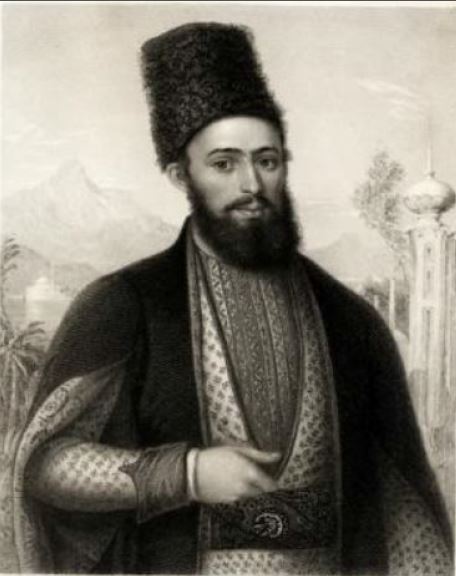
Muhammad `Ali, Alexander Kasimovich, Kazem Beg (b. Gilan 1803-1870).
Towards a History of Babi-Baha'i Scholarship:
Select Diplomats, Orientalists, Academics and Missionaries and their Attitudes towards the Babi-Baha'i religions.
Stephen Lambden
IN PROGRESS
Under revision , correction and completion 2021> - last updated 02-042-2021.
The notes and links or URLs, etc here will eventually be separated into sections constituting chapters for one or more forthcoming publications.
PART 1
Select Scholars, Diplomats and Orientalists and the Genesis of the study of the Babi-Baha'i Religions.
RUSSIA - Scholars, diplomats orientalists.
- Muhammad `Ali, Hajji Ibn Qasim Olgy, Alexander Kasimovich, Kazem Beg (b. Gilan 1802-1870) of the Department of Oriental Languages, Kazan University and, from 1855, first dean of the Faculty of Oriental Languages, St. Petersburg University. I Biography.
- Alexander Kazem Beg I Bibliography + wrote on the religon of the Bab from c. 1865
- Bernard Dorn, or (Russ.) Boris Andreevich (1805-1881), the third head of the Asiatic Museum, St. Petersburg (founded 1818).
- Victor R. Rosen (1849-1908).
- Valentin A. Zhokovskii (1858-1918), pupil of Carl Gustav Hermann Salemann (Russ.) Karl Germanovich,(1849-1916) who was a pupil of Rosen.
- Alexander G. Tumanskii (1861-1920).
- Wilhelm V. Barthold or (Russ.) Vassilii Vladimovitch (1860-1930).
- Vladimir A. Ivanow (1886-1970).
FRANCE - Scholars, diplomats orientalists.
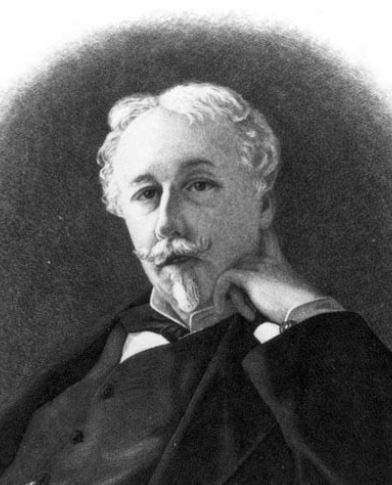
Joseph Arthur, Comte de Gobineau (1816-1882).
- Joseph Arthur, Comte de Gobineau (b near Paris.1816 – d. Turin,1882) I Biography. He was a "French man of letters, artist, polemist, Orientalist, and diplomat" (Jean Calmard in EIr.). His Paris1865 Religions et philosophies dans l'Asie centrale brought the religion of the Bab to international attention. Many, such as the British Persianist Edward G Browne (see below), were moved to enquire further.
- Comte de Gobineau II Bibliography+
- EIr. http://www.iranicaonline.org/articles/gobineau
- Clement Huart (Marie-Clément Imbault-Huart, b. Paris 1854-d. Paris, 30th December,1926). French orientalist
- EIr. http://www.iranicaonline.org/articles/huart-clment
- Henry Corbin (b. Paris, 1903-d. Paris, 1978), was not a Baha'i or one who wrote anything of substance on Babi-Baha'i subjects, but one who occasionally had positive relations with 20th cent. Iranian Baha'is. Many of his wriitings provide essential background materials for the study of the Shaykhi and Babi-Baha'i religions.
- EIr. http://www.iranicaonline.org/articles/corbin-henry-b
BRITAIN/ UK - Scholars, diplomats orientalists.
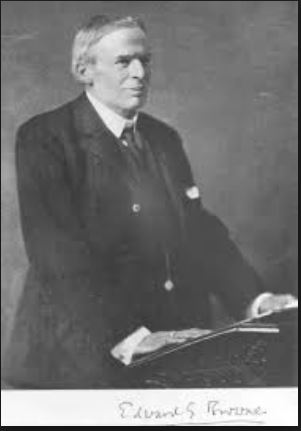
Edward Granville Browne (1862-1926)
- Edward Granville Browne (1862-1926) I Biography.
- http://www.iranicaonline.org/articles/browne-edward-granville
- Edward Granville Browne II Bibliography+
- The role of EGB in the emergence of Babi-Baha'i scholarship.
- Hasan Balyuzi, Edwrd Granville Browne and the Baha;i Faith.
GERMANY
HUNGARY- Scholars, diplomats orientalists.
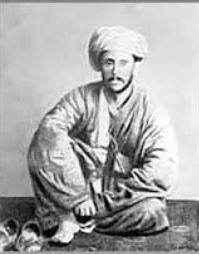

Arminius Vambery (1832-1913) + Signature of Arminius Vambery from an 189X Letter to the Cambridge Arabist William Wright (1830-1889).
- Arminius Vambery / Ármin Vámbéry ( b. Dunajská Streda, Slovakia, 1832 d. Budapest, Hungary, Sept. 15th 1913). Biography I.
- Arminius Vambery (1832-1913) II Bibliography +
- Ármin Vámbéry and the Babi-Baha'i religions.

Ignác Goldziher (1850-1921).
Ignác [= Ignaz, Ignatius] Yitzhaq Yehuda [= Isaac Judah] Goldziher (b. Székesfehérvár [Hungary] 22 June 1850 – 13 November 1921). He came from a Jewish family and had a traditionalist Jewish education but became the reputed father of modern Islamic Studies. He remained a Jew all his life but had a great empathy with intellectual currents within Sunni and other dimensions of Islam. Goldziher met `Abd al-Baha' whom he regarded very highly and with whom he corresponded.
DENMARK-NORWAY- Scholars, diplomats orientalists.
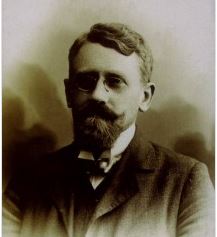
Arthur Emanuel Christensen (1875-1945)
- Prof. Arthur Christensen of Copenhagen (b. 1875, d. Copenhagen 1945). Danish Orientalist with a particular interest in Iranian studies. Among other things he "studied Persian and Arabic with A. F. van Mehren, Avestan with Edvard Lehmann, Sanskrit with V. Fausbøll, and Turkish with Johannes Østrup" . During his travels in the Near East Christensen acquired a large number Arabic and Persian manuscripts.
- EIr. http://www.iranicaonline.org/articles/christensen-arthur-emanuel-b
PART II - ROOTS AND INTERNAL SCHOLARSHIP.
BABI-BAHA'I STUDIES - ROOTS AND ORIGINS, SOME HISTORICAL NOTES.
- The origins of Babi-Baha'i Studies-Apologetics during the Babi period (1844-1852).
Some learned followers of Sayyid `Ali Muhammad Shirazi, the Bab
- Mulla Husayn Bushru'i (d. 1265/1849).
- Sayyid Yahya Darabi Vahid (b. Yazd c. 1811 - d. Nayriz, 1266/1850).
- EIr. http://www.iranicaonline.org/articles/darabi-sayyed-yahya
- Fatima Baraghani, Tahira (The Pure One), Qurrat al-`Ayn ("Solace for the Eyes") (d. 1852).
- Hajji Sayyid Javad Karbala'i (d. 1882), the Babi and Baha'i grandson of Sayyid Muhammad Mahdi Tabataba'i (b. Karbala, 1742- d. 1212/1797), Bahr al-`Ulum ("The Ocean of the Religious Sciences"), the massively, ultra-learned Shi`i Mujtahid, Marja al-Taqlid (Source of Emulation).
INTERNAL BAHA'I SCHOLARSHIP AND APOLOGETICS I (1863-1892)
- Some Aspects of the Evolution of Babi-Baha'i Studies during the lifetime of Baha'-Allah (1817-1892) and the emergence of the Baha'i religion.
Some learned followers of Mirza Husayn `Ali Nuri, Baha'-Allah and their writings.
- Mirza Abu'l-Fadl Gulpayigani (b. near Gulpayigan, 1844- d. Cairo, 1914).
- EIr. http://www.iranicaonline.org/articles/abul-fazl-or-abul-fazael-golpayega....
- Mirza Abu'l-Fadl Gulpayigani (1844-1914) and the Emergence of Istidlaliyya ("Proof-Text Testimonia") Literatures in the East.
- Sharḥ āyāt-i muvarrikha ("Commentary upon the Chronological Testimonia") . Trans. Stephen Lambden (1982) Under revision and completion 2015-2022.
- A Bibliography of the writings of Mirza Abu al-Fadl Gulpayigani (1844-1914), Translations and select literature about him.
Further key early Babi-Baha'i Scholars and Apologists.
- Mirza Ahmad Azghandi (b. Azghand, d. Mashhad ), an early convert of Mulla Husayn Bushru'i he was perhaps the first Babi-Baha'i in Khurasan.
- Muhammad-i Qa'ini, Nabil-i-Akbar, Fadil-i-Qa ini (1829-1892). He studied kalam ("theology") and the Hikmat al-Ishraq (The Philosophy of Illumination) of Shihab al-Din Yahya Suhrawardi (d. [executed] Aleppo, 587/1191) and his followers with one of the foremost poets and philosophers of Qajar Persia, Ḥājji Mullā Hādi Sabzavāri (1797-d. Sabzavār, 1289/1873).
- EIr. http://www.iranicaonline.org/articles/nabil-e-akbar
- Haji Mirza Muhammad Afshar, ( ) authored the important Istidlaliyya work entitled Bahr al-`Irfan (The Ocean of Gnosis").
- PDf. See also Behmardi,
- Mirza 'Ali Ashraf Lahijani, `Andalib ("Nightingale") (b. Lahijan [Gilan] 1853- d. Shiraz,1919).
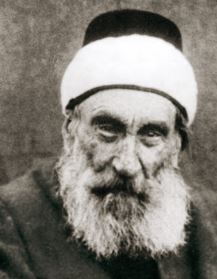
- Hajji Mirza Haydar Ali Isfahani ( b. Isfahan, XXXX- d. Haifa, 1920).
- Mirza `Ali-Muhammad Khurasani (b. Mashhad 1267/1850- d. Tehran, 1347/1928), known as Ibn-i-Aṣdaq. He was son of the Shaykhī, Bābī and Baha’i Mullā Ṣādiq Muqaddas-i Khurāsānī (d.1306/1889), who was entitled Ism-Allāh al-Aṣdaq by the Bāb. In 1920 with Ahmad Yazdani, Ibn-i Asdaq delivered the `Tablet to The Hague' of ‘Abdu’l-Baha to the Central Organisation for Durable Peace.
- EIr. http://www.iranicaonline.org/articles/ebn-asdaq
- Abu'l-Hasan Mirza Qajar Shaykh al-Ra'is (1848-1920).
- Sayyid Ahmad Musawi Hamnadani ( ) entitled Ṣadr al-Ṣudūr ("The Apex of the Inmost Hearts"). Istidlaliyya-yi mukhtasar-i Ṣadr al-Ṣudūr Tehran: MMMA, 132 B.E./1976.
- PDf. Ms Persian Istidlaliyya. INBMC vol.25 : INBMC 25-Istidlaliyya.pdf
- Mirza Mihdi Arjmand or Mi'r [Mihdi] son of Aqa Rafa'il [Raphael] (b. Hamadan, 1240/1861-d. Tehran 1320/ 1941). An erudite Aaronite Jewish background Baha'i educated in the Talmud-Torah school and by profession a goldsmith. He was converted by Mirza `Ali Muhammad Ibn-i Asdaq (d.1928) in 1295/1878 (see Gulshan-i Haqa'iq and `Haj Mihdi Arjmand' by Iraj Ayman).
- Mirza Asad-Allah Fadil-i Mazandarani (b. Barfarush, c. 1880- d. Tehran December 26, 1957).
INTERNAL BAHA'I SCHOLARSHIP AND APOLOGETICS II (1892-1921).
- Babi-Baha'i Studies during the ministry of `Abd al-Baha' (d.1921).
- Shaykh Muhamad Ibrahim Fadil-i Shirazi ( ).
INTERNAL BAHA'I SCHOLARSHIP AND APOLOGETICS III (1921-1957).
PERSIA, THE MIDDLE EAST AND ELSEWHERE.
The Emergence of Babi-Baha'i Studies during the ministry of Shoghi Effendi (1921-1957).
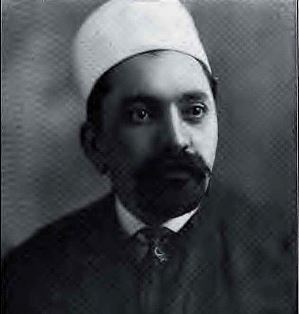
Mirza Muhammad Fadil-i Mazandarani (b. Barfurush, now Babul, c.1880-d. Khuranshahr [Iran] Dec. 16th 1957). The son of a Shaykhi named Mīrzā Maḥmūd, he became a Baha'i in Tehran in c. 1909.
Among his best known books or witings are:
- Kitāb ẓuhūr al-ḥaqq (The Book of the Manifestation of the True One"). A nine volume history, compilation and biography of the Shaykhi Babi and Baha'i religions, their central figures and prominent believers. This remains in mss though a number of vulumes have been printed or are being reprinted,most notably the third volume relating to the religion of the Bab (Tehran: MMMA., nd.,194X ) and VIII in two volunes, Tehran MMMA, XXX BE.,/1974-75.
- Asrār al-āthār ("The Mysteries of the Scriptural Writings"). 5 vols., Tehran: MMMA: XXX BE/ 1967-72). An alphabetically organized lexicon of key Babi-Baha'i scriptural motifs, subjects and terminology.
- ʿAmr wa Khalq. ("The Cause and the Creation") 4 vols., Tehran: MMMA., XXX BE., 1954, repr. in 2 vols., Langenhain, Germany, 1985-86. A compilation of largely thematically arranged Babi-Baha'i scriptural passages.
For some further details see Moojan Momen, FĀŻEL MĀZANDARĀNĪ, MĪRZĀ ASAD-ALLĀH in Encyclopedia Iranica :
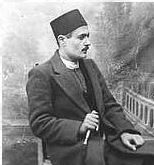
`Abd al-Hamid Ishraq Khavari, اشراق خاوري (b. Mashhad, 1902 – d. Tehran, 6th August, 1972). A Baha'i from 1927 Ishraq Khavari edited and authored numerous Persian and Arabic Babi-Baha'i writings and compilations of Baha'i primary sources. An outstanding commemtator and exegete, he stands among the most influential Persian Baha'i expounders of the Babi-Baha'i religion in the 20th century. For further details see Rafati, EŠRĀQ ḴĀVARĪ, ʿABD-AL-ḤAMĪD in Encyclopedia Iranica + refs. and bibliography:
In loosely chronological order, his best known works include :
- Raḥīq-i makhtūm ("The Sealed Wine"). 2 vols., Tehran:MMMA., 103 BE./1946. + Reprints. A commenary or glossary upon a centennial history of Shoghi Effendi entitled Lawh-i qarn and the related God Passes By.
- Ayyām-i tisʿa ("The Nine [Baha'i Holy] Days"). Tehran : MMMA.,103 B./1946. + Reprints. A compilation of primary Babi-Baha'i Arabic and Persian scriptural sources relating to the nine annual Baha'i Holy Days.
- Qāmūs-i īqān. 4 vols., Tehran, 127-28 BE. /1970-71. A glossary on key phrases in the Kitab-i iqan (The Book of Certitude, c. 1861) of Baha'-Allah.
- Ganjīna-yi ḥudūd wa aḥkām ("The Treasury of Laws and Ordinances". Tehran: MMMA., 128 BE/1971. Notes and Commentary upon Babi-Baha'i laws and precepts as contained in the Kitab-i aqdas (Most Holy Book, c. 1873) and other related writings of the central figures of the Baha'i religion.
Muhammad `Ali Faydi (XXXX-XXXX) is well-known as an erudute Baha'i scholar, historian and teacher. Among his published writings is one of the life, mission and writings of the Bab entitled Hadrat-i Nuqtah-'i Ula. Rep. Hofheim-Langenhain: Bahá'í-Verlag, 1987. On the Afnan family of the Bab he wrote, Kitab-i khandan-i afnan. Tehran: Mu'assasa-yi Milli-yi Matbu`at-i Amri, 127 BE/ 1971-2. His Nayriz-i Mushkbiz (Tehran: MMMA, 129/1973) is about the Babi upheavals at Nayriz. On the life of Baha'-Allah he wrote Hadrat-i Baha'-Allah . His quite lengthy commentary on Baha'-Allah's (c. 1891 CE) Lawh-i Ibn-i Dhi`b or `Epistle to the Son of the Wolf' (which was addressed to Muhammad Baqir Isfahani) and aspects of his scriptural Tablet to Nasir al-Din Shah (c.1867), is entitled La'ali-yi darakhshan az Lawh-i Mubarak-i Shaykh va Sultan, [Shiraz / Tehran] : 123/ 1967. On the Tablets of Baha'-Allah to the kings and rulers he wrote another volume entitled Khitabat-i qalam-i a`la dar sha'n-i nuzul-i alvah-i muluk va salatin. [Tehran?] 1336 Sh./1957-8. He dealt with the life of `Abd al-Baha' in his Hayat-i Hadrat-i `Abdu'l-Bahá (On the Life of His holiness `Abd al-Baha'). Tehran: MMMA, 128/1971.
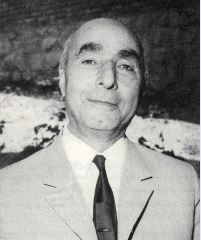
- `Azizu'llah Sulaymani (b. Kelateh Nov. 10, 1901-d. Gunbad-Kavus, in Mazandaran, 24 October 1985). More precisely and according to his son Koumarth Sulaymani "he was born in the village of Kelateh Yazd-Abad next to Sabzevar, in Khurasan". Sulaymani is perhaps best known today for his Persian Masabih-yi hidayat (The Lights of Guidance) in 10 volumes containing biographies of around 99 prominent Baha’is in over 5,000 pages with numerous Persian and Arabic scriptural Tablets (alwah) written for, about or in honor of these various individuals whose faith was often realized during the early days or first century of the Babi-Baha'i era (1844-1944). Refer : https://www.h-net.org/~bahai/areprint/authors/sulayman/sulaymani.htm
- For some biographical details see `A brief biography of ‘Azizu’llah Sulaymani -Translated by Adel Shafipour and edited by Robert Stauffer from 'Azizu’llah Sulaymani's biography written by his son, Koumarth Sulaymani, Payam-i Baha'i magazine, No. 99). Online at : https://www.h-net.org/~bahai/areprint/authors/sulayman/Sulaymani_Biograp....
THE EMERGENCE OF INTERNALLY GENERATED BABI-BAHA'I STUDIES IN THE WEST
The Genesis of Academic Babi-Baha'i Studies in the West : Britain/ the UK., France, Germany and other European countries.
- The Emergence of Babi-Baha'i Studies in the West, Some General Introductory Notes.
BRITAIN, THE UNITED KINGDOM


Edward Granville Browne (1862-1926) & Hasan M. Balyuzi (1908 - 1980).
- Edward Granville Browne (1862-1926) I Biography.
- http://www.iranicaonline.org/articles/browne-edward-granville
- Edward Granville Browne II Bibliography+
- The role of EGB in the emergence of Babi-Baha'i scholarship.
- Buck, Christopher, Youli, Ioannesyan: ` Scholar Meets Prophet: Edward Granville Browne and Baha’u’llah (Acre, 1890)' in Baha'i Studies Review, Vol. 20/1 (June 2014), pp.21-38. "Rediscovery of contemporaneous handwritten notes by Cambridge orientalist, Edward Granville Browne, of his historic meetings with Baha’u’llah, prophetfounder of the Baha’i Faith in Akka (St Jean d’Acre), Palestine, during his stay there – which lasted from his arrival on Sunday, 13 April 1890, to Browne’s departure on Sunday, 20 April 1890 – significantly adds to our knowledge of those spiritual and momentous events..." .
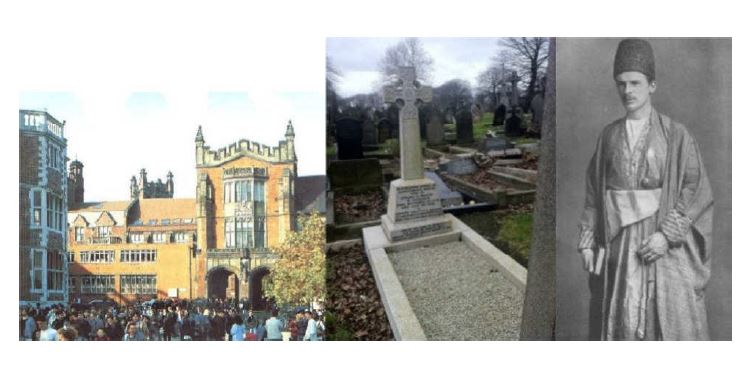
Hasan Muvaqqar Balyuzi (b. Shiraz, 7 September 1908 – d. London, 12 February 1980), son of Mirza `Ali Muhammad Khan Muvaqqar al-Dawlih (d. 1921)..

- Moojan Momen `Hasan M. Balyuzi (1908-1980), `A Bio-bibliographical Sketch' in Studies in Honour of the Late Hasan M. Balyuzi, (Los Angeles: Kalimat Press, 1988), pp. x-xx. PDf.
- Wikipedia : https://en.wikipedia.org/wiki/Hasan_M._Balyuzi
- Balyuzi Library+ http://news.bahai.org/story/1040/
FRANCE
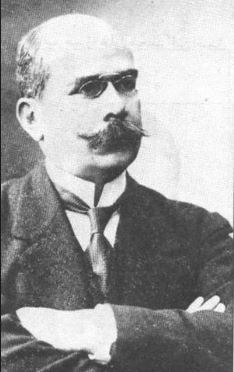
- Louis Alphonse Daniel Nicolas (b. Rasht [Persia] 1864-d. Paris, 1939), French historien and orientalist, interpreter for the French Legation.
- http://www.worldcat.org/identities/lccn-no2005-61089/

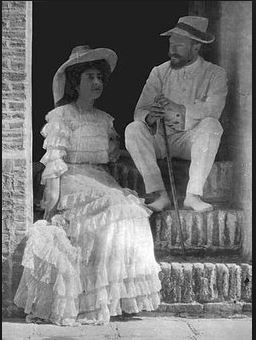
Hippolyte Dreyfus (1873-1928) and Laura Dreyfus-Barney (1879-1974).
- Hippolyte Dreyfus-Barney (b. Paris 1873, d. Paris, 20th Dec. 1928) and Laura Clifford Dreyfus-Barney ( 1879-1974).
- EIr. http://www.iranicaonline.org/articles/dreyfus-barney
FURTHER EUROPEAN COUNTRIES
- The Origins of Babi-Baha'i Studies in Germany.
- The Origins of Babi-Baha'i Studies in
- The Origins of Babi-Baha'i Studies in
- The Origins of Babi-Baha'i Studies in
- The Origins of Babi-Baha'i Studies in
THE USA AND CANADA
- The Origins of Academic Babi-Baha'i Studies in the USA.
- The Origins of Babi-Baha'i Studies in Canada.
SUPPLEMENTARY MATERIALS
- Notes, Papers and Studies pertaining to the Origins and Status of Academic Babi-Baha'i Studies.
- The Emergence of Istidlaliyya ("Proof-Text Testimonia") Literatures in the West.
- Select doctoral thesis in Babi-Baha'i Studies.



